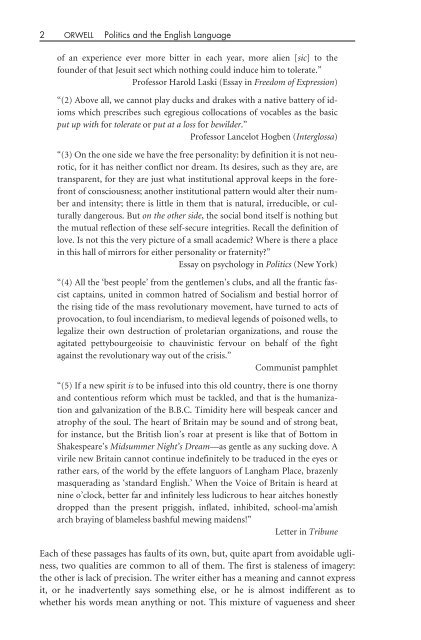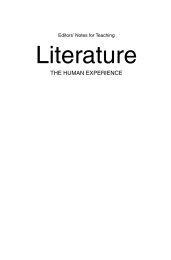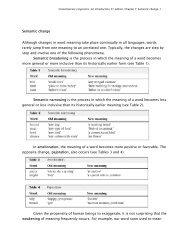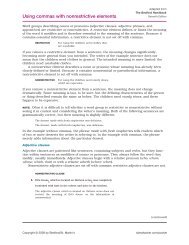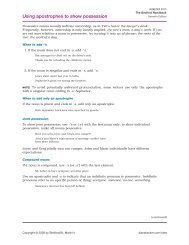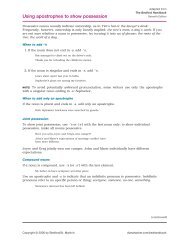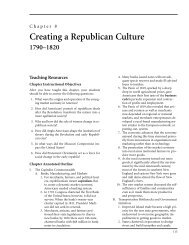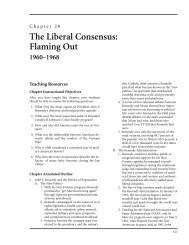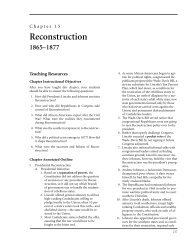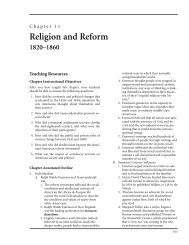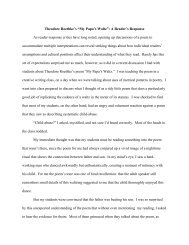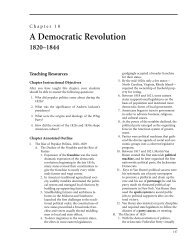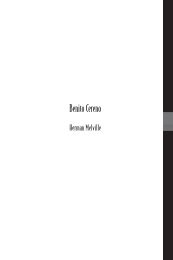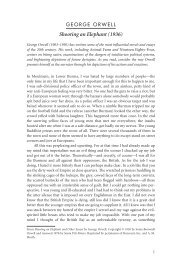GEORGE ORWELL, Politics and the English Language
GEORGE ORWELL, Politics and the English Language
GEORGE ORWELL, Politics and the English Language
You also want an ePaper? Increase the reach of your titles
YUMPU automatically turns print PDFs into web optimized ePapers that Google loves.
2 <strong>ORWELL</strong> <strong>Politics</strong> <strong>and</strong> <strong>the</strong> <strong>English</strong> <strong>Language</strong><br />
of an experience ever more bitter in each year, more alien [sic] to <strong>the</strong><br />
founder of that Jesuit sect which nothing could induce him to tolerate.”<br />
Professor Harold Laski (Essay in Freedom of Expression)<br />
“(2) Above all, we cannot play ducks <strong>and</strong> drakes with a native battery of idioms<br />
which prescribes such egregious collocations of vocables as <strong>the</strong> basic<br />
put up with for tolerate or put at a loss for bewilder.”<br />
Professor Lancelot Hogben (Interglossa)<br />
“(3) On <strong>the</strong> one side we have <strong>the</strong> free personality: by definition it is not neurotic,<br />
for it has nei<strong>the</strong>r conflict nor dream. Its desires, such as <strong>the</strong>y are, are<br />
transparent, for <strong>the</strong>y are just what institutional approval keeps in <strong>the</strong> forefront<br />
of consciousness; ano<strong>the</strong>r institutional pattern would alter <strong>the</strong>ir number<br />
<strong>and</strong> intensity; <strong>the</strong>re is little in <strong>the</strong>m that is natural, irreducible, or culturally<br />
dangerous. But on <strong>the</strong> o<strong>the</strong>r side, <strong>the</strong> social bond itself is nothing but<br />
<strong>the</strong> mutual reflection of <strong>the</strong>se self-secure integrities. Recall <strong>the</strong> definition of<br />
love. Is not this <strong>the</strong> very picture of a small academic? Where is <strong>the</strong>re a place<br />
in this hall of mirrors for ei<strong>the</strong>r personality or fraternity?”<br />
Essay on psychology in <strong>Politics</strong> (New York)<br />
“(4) All <strong>the</strong> ‘best people’ from <strong>the</strong> gentlemen’s clubs, <strong>and</strong> all <strong>the</strong> frantic fascist<br />
captains, united in common hatred of Socialism <strong>and</strong> bestial horror of<br />
<strong>the</strong> rising tide of <strong>the</strong> mass revolutionary movement, have turned to acts of<br />
provocation, to foul incendiarism, to medieval legends of poisoned wells, to<br />
legalize <strong>the</strong>ir own destruction of proletarian organizations, <strong>and</strong> rouse <strong>the</strong><br />
agitated pettybourgeoisie to chauvinistic fervour on behalf of <strong>the</strong> fight<br />
against <strong>the</strong> revolutionary way out of <strong>the</strong> crisis.”<br />
Communist pamphlet<br />
“(5) If a new spirit is to be infused into this old country, <strong>the</strong>re is one thorny<br />
<strong>and</strong> contentious reform which must be tackled, <strong>and</strong> that is <strong>the</strong> humanization<br />
<strong>and</strong> galvanization of <strong>the</strong> B.B.C. Timidity here will bespeak cancer <strong>and</strong><br />
atrophy of <strong>the</strong> soul. The heart of Britain may be sound <strong>and</strong> of strong beat,<br />
for instance, but <strong>the</strong> British lion’s roar at present is like that of Bottom in<br />
Shakespeare’s Midsummer Night’s Dream—as gentle as any sucking dove. A<br />
virile new Britain cannot continue indefinitely to be traduced in <strong>the</strong> eyes or<br />
ra<strong>the</strong>r ears, of <strong>the</strong> world by <strong>the</strong> effete languors of Langham Place, brazenly<br />
masquerading as ‘st<strong>and</strong>ard <strong>English</strong>.’ When <strong>the</strong> Voice of Britain is heard at<br />
nine o’clock, better far <strong>and</strong> infinitely less ludicrous to hear aitches honestly<br />
dropped than <strong>the</strong> present priggish, inflated, inhibited, school-ma’amish<br />
arch braying of blameless bashful mewing maidens!”<br />
Letter in Tribune<br />
Each of <strong>the</strong>se passages has faults of its own, but, quite apart from avoidable ugliness,<br />
two qualities are common to all of <strong>the</strong>m. The first is staleness of imagery:<br />
<strong>the</strong> o<strong>the</strong>r is lack of precision. The writer ei<strong>the</strong>r has a meaning <strong>and</strong> cannot express<br />
it, or he inadvertently says something else, or he is almost indifferent as to<br />
whe<strong>the</strong>r his words mean anything or not. This mixture of vagueness <strong>and</strong> sheer


